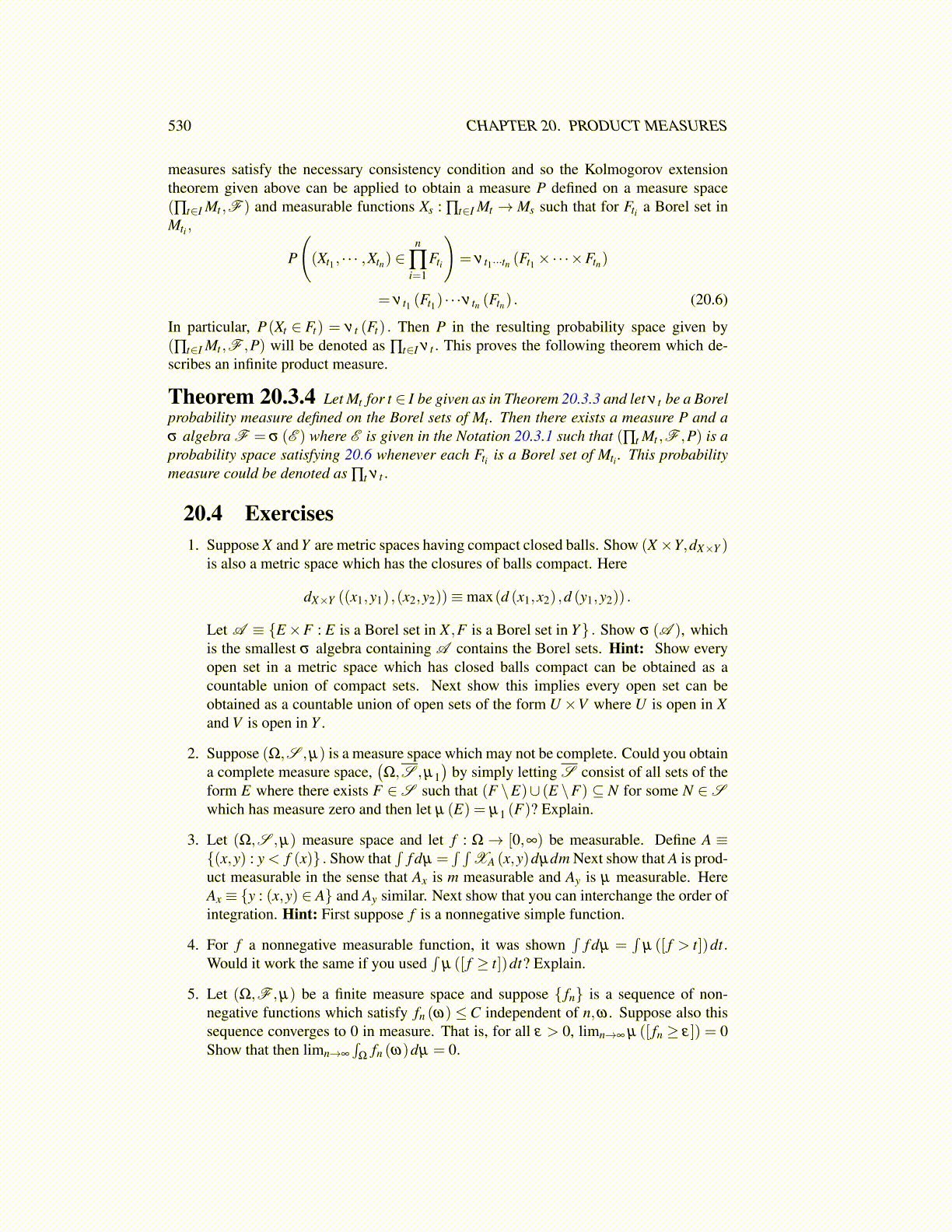
530 CHAPTER 20. PRODUCT MEASURES
measures satisfy the necessary consistency condition and so the Kolmogorov extensiontheorem given above can be applied to obtain a measure P defined on a measure space(∏t∈I Mt ,F ) and measurable functions Xs : ∏t∈I Mt → Ms such that for Fti a Borel set inMti ,
P
((Xt1 , · · · ,Xtn) ∈
n
∏i=1
Fti
)= ν t1···tn (Ft1 ×·· ·×Ftn)
= ν t1 (Ft1) · · ·ν tn (Ftn) . (20.6)
In particular, P(Xt ∈ Ft) = ν t (Ft) . Then P in the resulting probability space given by(∏t∈I Mt ,F ,P) will be denoted as ∏t∈I ν t . This proves the following theorem which de-scribes an infinite product measure.
Theorem 20.3.4 Let Mt for t ∈ I be given as in Theorem 20.3.3 and let ν t be a Borelprobability measure defined on the Borel sets of Mt . Then there exists a measure P and aσ algebra F = σ (E ) where E is given in the Notation 20.3.1 such that (∏t Mt ,F ,P) is aprobability space satisfying 20.6 whenever each Fti is a Borel set of Mti . This probabilitymeasure could be denoted as ∏t ν t .
20.4 Exercises1. Suppose X and Y are metric spaces having compact closed balls. Show (X×Y,dX×Y )
is also a metric space which has the closures of balls compact. Here
dX×Y ((x1,y1) ,(x2,y2))≡max(d (x1,x2) ,d (y1,y2)) .
Let A ≡ {E×F : E is a Borel set in X ,F is a Borel set in Y} . Show σ (A ), whichis the smallest σ algebra containing A contains the Borel sets. Hint: Show everyopen set in a metric space which has closed balls compact can be obtained as acountable union of compact sets. Next show this implies every open set can beobtained as a countable union of open sets of the form U ×V where U is open in Xand V is open in Y .
2. Suppose (Ω,S ,µ) is a measure space which may not be complete. Could you obtaina complete measure space,
(Ω,S ,µ1
)by simply letting S consist of all sets of the
form E where there exists F ∈S such that (F \E)∪ (E \F) ⊆ N for some N ∈Swhich has measure zero and then let µ (E) = µ1 (F)? Explain.
3. Let (Ω,S ,µ) measure space and let f : Ω→ [0,∞) be measurable. Define A ≡{(x,y) : y < f (x)} . Show that
∫f dµ =
∫ ∫XA (x,y)dµdm Next show that A is prod-
uct measurable in the sense that Ax is m measurable and Ay is µ measurable. HereAx ≡ {y : (x,y) ∈ A} and Ay similar. Next show that you can interchange the order ofintegration. Hint: First suppose f is a nonnegative simple function.
4. For f a nonnegative measurable function, it was shown∫
f dµ =∫
µ ([ f > t])dt.Would it work the same if you used
∫µ ([ f ≥ t])dt? Explain.
5. Let (Ω,F ,µ) be a finite measure space and suppose { fn} is a sequence of non-negative functions which satisfy fn (ω) ≤C independent of n,ω . Suppose also thissequence converges to 0 in measure. That is, for all ε > 0, limn→∞ µ ([ fn ≥ ε]) = 0Show that then limn→∞
∫Ω
fn (ω)dµ = 0.